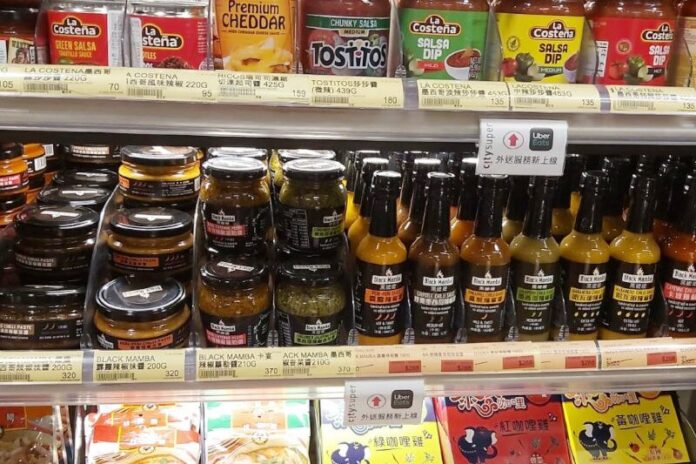With its vast areas of arable land, favourable climate and affordable labour, Africa possesses significant potential to export packaged food products to developed countries. Additionally, global interest in unique African foods is on the rise. Tapping into this potential is Black Mamba, a chilli sauce producer based in Eswatini (formerly Swaziland), founded in 2010. To date, it has exported to 15 countries, with the UK, Norway, and Germany being prominent markets. Jaco Maritz spoke to Claudia Castellanos, co-founder and CEO of Black Mamba, about the strategies she has employed to expand the company’s export markets.
The company’s first export order came from a distributor in Germany who had previously purchased handcrafted products from Eswatini. Before founding Black Mamba, Castellanos consulted for handcraft businesses in Eswatini and was acquainted with this distributor. During one visit, he encountered Black Mamba’s chilli sauce and believed it would be well-received on German shelves.
As a result, he ordered four cartons. This order marked Black Mamba’s introduction to the procedures and logistics of exporting and was a valuable learning experience for the company on how to navigate the export process.
Black Mamba’s presence in a store at Johannesburg’s OR Tambo International Airport paved the way for its introduction into Norway. In 2016, Claudia received an email from an individual in Norway who received a bottle of Black Mamba chilli sauce purchased from the OR Tambo store.
This person happened to be a distributor of African products in Norway. Impressed by the sauce, he expressed his interest in distributing it in Norway. Today, Norway is a key market for Black Mamba, with the sauce available in two of the country’s largest supermarkets and on major e-commerce platforms.
The company strategically targets countries where a sizable part of the population values organic ingredients and appreciates Black Mamba’s dedication to benefiting the local communities where the products are made. Furthermore, it focuses on markets where individuals have a good disposable income and a fondness for new and different foods.
Claudia emphasises that the products cater to consumers who “are willing to pay a premium for items they recognise as beneficial to both the planet and communities”. Additionally, the company prioritises countries with no import duties for products from Eswatini, making its sauces more competitive.
collaborates with only one distributor per country. “We rather stick to one person that we believe wants to grow the brand,” she remarks. Today, the company maintains a tight-knit relationship with its distributors. Castellano recalls, “In the beginning I used to be just, ‘Oh, here’s your shipment, have fun, enjoy. Contact me when you need your next order.’ Nowadays it is literally a weekly meeting.”
The United Arab Emirates is also an important territory for Black Mamba. According to Castellanos, it’s a market teeming with consumers who have disposable income and a penchant for new products. The company is currently navigating listings with regional supermarkets.
However, Castellanos emphasises that securing listings with supermarkets can be a protracted affair, sometimes taking years. That’s why, in the interim, it has targeted listings on local e-commerce platforms. Furthermore, Black Mamba has tapped into Taiwan, capitalising on its residents’ strong purchasing power and interest in novel foods.
Castellanos also sees significant growth potential for Black Mamba in the US. In 2020, the company received an investment from an American VC firm, Enygma Capital, which has aided in expanding its presence in North America.
Participation in international trade shows has proven pivotal for Black Mamba’s entry into new markets. For instance, with the help of a USAID-backed programme aimed at assisting export-ready businesses in Southern Africa to tap into the American market, Black Mamba has exhibited at events like the Fancy Food Show in New York.
Through the International Trade Centre, Black Mamba has also taken part in trade shows in the United Arab Emirates, which led to its entry into the Dubai market. And, sponsored by the Eswatini government, the company has attended the Food Taipei show, leading to a partnership with its current distributor in Taiwan.
Castellanos believes that trade shows offer more than just a platform to showcase the company’s products to retailers and distributors. They also provide insight into the market’s structure and an understanding of competitors.
The approach to trade shows has evolved as the business has grown. In the company’s early days, Castellanos attended trade shows without a concrete plan, merely hoping for interested buyers to stop by their booth. Now, the company gears up for trade shows months ahead of time.
Castellanos identifies which buyers she wants to connect with, reaches out to them via email to announce Black Mamba’s attendance, and schedules meetings ahead of time. “So when you go there,” she explains, “it’s an intense two or three days of non-stop work focused on building those markets.”
Black Mamba primarily partners with distributors in its export countries, though in some instances, it deals directly with retailers. Castellanos points out that one advantage of this distributor approach is their pre-existing relationships with various retailers.
Typically, Black Mamba collaborates with only one distributor per country. “We rather stick to one person that we believe wants to grow the brand,” she remarks. Today, the company maintains a tight-knit relationship with its distributors. Castellano recalls, “In the beginning I used to be just, ‘Oh, here’s your shipment, have fun, enjoy. Contact me when you need your next order.’ Nowadays it is literally a weekly meeting.
Regarding the marketing of its products overseas, Castellanos says that it’s typically a collaborative effort between Black Mamba’s marketing team, its distributors, and occasionally, the distributors’ marketing agencies abroad. To ensure brand consistency worldwide, Black Mamba has devised a global marketing strategy and established brand guidelines.
Another important consideration is how to divide the marketing budget between Black Mamba and its distributors in these countries. Castellanos mentions that Black Mamba usually provides distributors with complimentary access to the marketing artwork and other assets, as well as product samples, which are crucial for sparking initial consumer interest. Nonetheless, Black Mamba leans on the local market knowledge of its international partners, be it in choosing in-country influencers or pinpointing optimal dates for tastings and promotions.
Castellano strongly believes in the benefits of strategic networking and being proactive. She sees networking as her superpower. For her, LinkedIn has been invaluable in landing new export clients. Knowing that a cold outreach to a buyer or distributor might not be as effective as a personal introduction, she checks if the person she’s targeting is connected to someone she knows. If they are, she then asks for an introduction.
The Black Mamba CEO underscores her tenacity when approaching potential buyers. While some may find her persistence irksome, she believes, “There’s also the possibility that they say, ‘Yes, come and meet me’. And they’re impressed with your persistence and courage. So that has opened a lot of doors for me.” She further notes, “A thing that I’ve learned through life is that the worst thing that can happen is that they can say ‘no’.”








